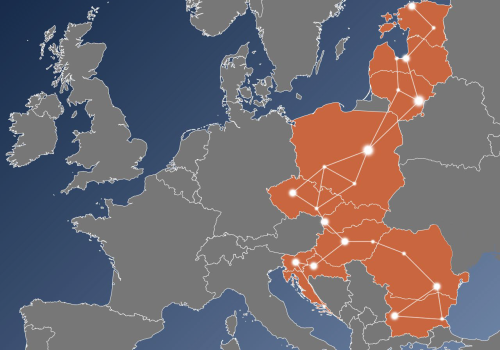As the global community continues to grapple with the coronavirus (COVID-19), the Atlantic Council is open for business. Our business, meetings, and events, however, are occurring virtually. For more information, please read an update from our President and CEO.
Digitalization has been heralded as “the next engine of growth” for the economies of Central and Eastern Europe (CEE) and the idea that digitalization can transform the region’s economic model has never been more relevant than amid the current coronavirus pandemic. In the 2018 seminal “Digital Challengers” study, McKinsey & Company estimated that a concerted effort at digitalization could add up to €200 billion to the region’s GDP. Now, accelerated digital adaptation provides an opportunity for Central and Eastern Europe to emerge from the COVID-19 crisis stronger and more resilient. If the region is to leverage digitalization to fuel economic recovery and overcome some of its own limitations—from market size and fragmentation to access to capital and the investor appeal of local technology clusters—there seem to be few alternatives to working together at a regional level. But for a variety of reasons, it has proven challenging to build greater cooperation and policy coordination among CEE countries in this area. Even though there is a general consensus on the digital potential of the CEE countries, there is little clarity about how Central and Eastern Europe as a region can best move forward with digitalization to secure its full benefits and become leaders in shaping its future trajectory.
Convinced of the role digitalization can play in Central and Eastern Europe’s economic future and encouraged by new momentum in the debate, the Atlantic Council convened a task force of US and CEE digital innovators, experts, and thought leaders. The task force sought to move beyond the generalities about digitalization in Central and Eastern Europe and explore the missing piece – the “how?” How does Central and Eastern Europe capture the potential of digitalization with concrete steps toward regional cooperation? How does the region advance its strategic digitalization objectives through regional efforts such as the Three Seas Initiative (3SI), at an EU level, and through transatlantic cooperation?
This event features key members of the Atlantic Council task force to discuss the urgent issues that must be addressed in Central and Eastern Europe in order to advance digitalization and seize the region’s full potential. The panel outlines the report’s key findings and explains the critical role of regional cooperation to advance the digital transformation of Central and Eastern Europe.
Opening remarks by:
Ambassador Paula J. Dobriansky
Senior Fellow, Harvard University Belfer Center for Science and International Affairs; Vice Chair, Scowcroft Center for Strategy and Security, Atlantic Council; Former Under Secretary of State for Global Affairs
Mr. Maciej Witucki
President
Confederation of Lewiatan
Featuring:
Minister Gergana Passy
Digital Champion of Bulgaria; President, Digital National Alliance; Former Minister of EU Affairs of Bulgaria
Minister Žiga Turk
Professor in Construction Informatics, Faculty of Civil and Geodetic Engineering, University of Ljubljana; Former Minister for Growth of Slovenia; Former Minister for Education, Science, Culture, and Sports of Slovenia
Minister Rimantas Žylius
Founder, European Public Policy Institute; Former Minister of Economy of Lithuania
Moderated by:
Dr. Fran Burwell
Distinguished Fellow, Future Europe Initiative, Atlantic Council; Senior Director, McLarty Associates

Future Europe Initiative
Providing expertise and building communities to promote transatlantic leadership and a strong Europe in turbulent times.
The Future Europe Initiative promotes the transatlantic leadership and strategies required to ensure a strong Europe.
